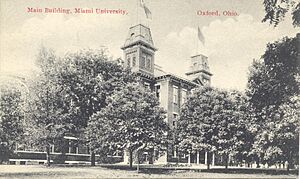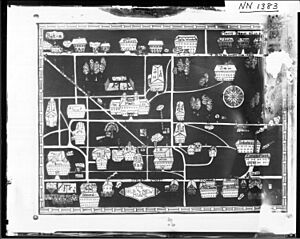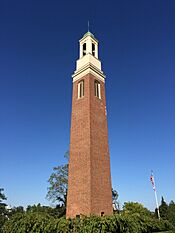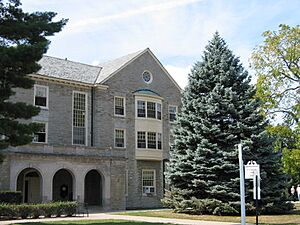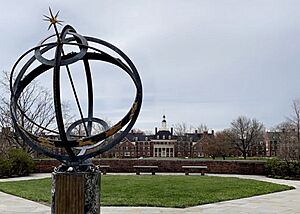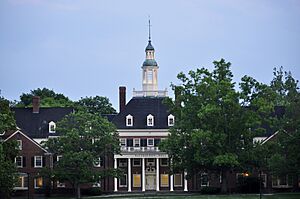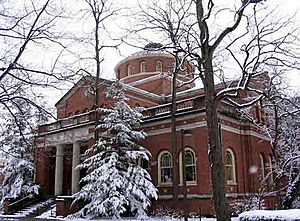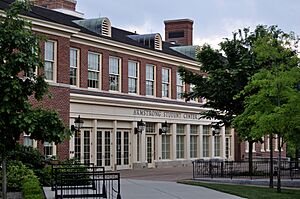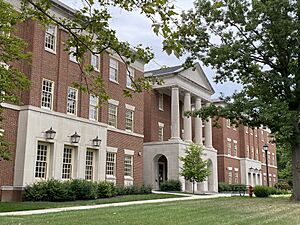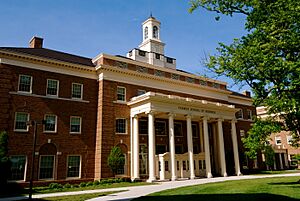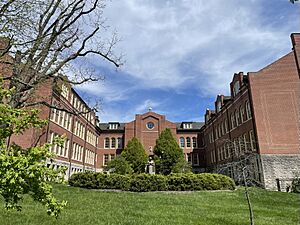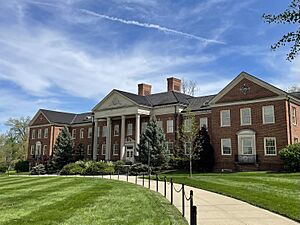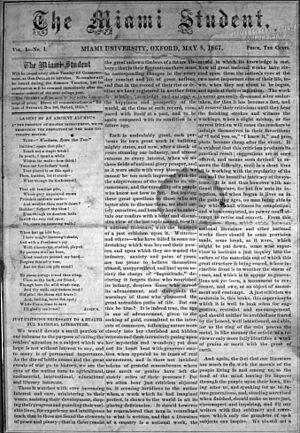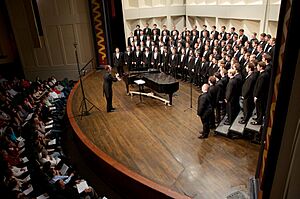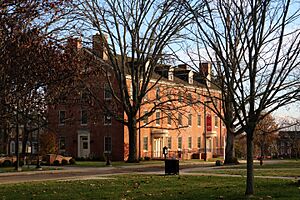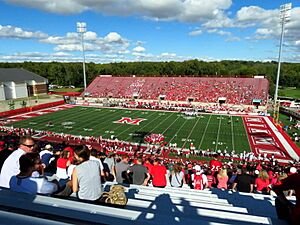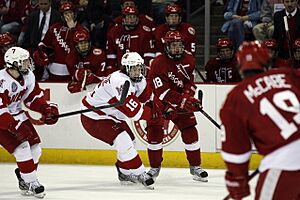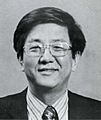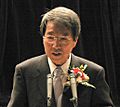Miami University facts for kids
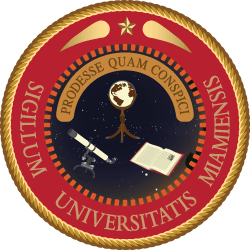 |
|
| Latin: Universitas Miamiensis | |
| Motto | Prodesse Quam Conspici (Latin) |
|---|---|
|
Motto in English
|
"To accomplish without being conspicuous" |
| Type | Public research university |
| Established | February 2, 1809 |
|
Parent institution
|
University System of Ohio |
| Accreditation | HLC |
|
Academic affiliations
|
|
| Endowment | $686 million (2022) |
| President | Gregory Crawford |
| Provost | Elizabeth Mullenix |
|
Academic staff
|
973 (Oxford) 1,130 (all campuses) |
| Students | 19,752 (Oxford) 24,377 (all campuses) |
| Undergraduates | 17,327 (Oxford) 21,991 (all campuses) |
| Postgraduates | 2,425 (Oxford) |
| Location |
,
,
United States
39°30′43″N 84°44′05″W / 39.511905°N 84.734674°W |
| Campus | Fringe town, 2,138 acres (8.65 km2) |
| Other campuses | |
| Newspaper | The Miami Student |
| Colors | Red and white |
| Nickname | RedHawks |
|
Sporting affiliations
|
|
| Mascot | Swoop the RedHawk |
 |
|
Miami University (also called Miami of Ohio or just Miami) is a public research university in Oxford, Ohio, United States. It was started in 1809. This makes it the second-oldest university in Ohio. It is also one of the oldest public universities in the United States. Miami was known as one of the original "Public Ivy" schools. This means it offered an education similar to the famous Ivy League universities, but at a public school cost.
Miami University has a main campus in Oxford, Ohio. It also has smaller campuses in Hamilton, Middletown, and West Chester. There is even an international campus in Differdange, Luxembourg, called the Dolibois European Center.
The university offers many different study programs. Students can choose from over 120 undergraduate (first degree) programs. There are also more than 70 graduate (advanced degree) programs. These are spread across 7 schools and colleges. Miami is known for its strong programs in architecture, business, engineering, humanities, and science.
Miami University has a long history with Greek life. Five social Greek-letter groups were actually started at Miami. This earned the university the nickname "Mother of Fraternities". Today, about one-third of students are part of a fraternity or sorority.
Miami's sports teams are called the Miami RedHawks. They compete in NCAA Division I. Most teams play in the Mid-American Conference. However, the ice hockey team competes in the National Collegiate Hockey Conference.
Contents
History of Miami University
The Early Years (1809–1873)
The idea for Miami University began with a law signed by President George Washington. This law said a school should be built in the Miami Valley of Ohio. In 1803, Congress gave land to Ohio to build a college. The Ohio Legislature officially started Miami University on February 2, 1809. This date is considered the university's founding. The town where the university was built was named Oxford, Ohio, in 1810.
Construction stopped for a while because of the War of 1812. In 1824, Robert Hamilton Bishop became Miami's first President. He believed that teaching should be based on the Bible. Classes officially began on November 1, 1824. There were 20 students and two teachers. Students studied subjects like Greek, Latin, Algebra, and Geography.
Students started their first newspaper, The Literary Focus, in 1827. It didn't last long, but it led to The Literary Register. Today, The Miami Student newspaper traces its roots back to these early papers. It claims to be the oldest college newspaper in the U.S.
In 1833, Alpha Delta Phi became the first fraternity chapter west of the Allegheny Mountains. Then, in 1839, Beta Theta Pi was the first fraternity actually started at Miami.
By 1839, Miami had 250 students from 13 states. Only Harvard, Yale, and Dartmouth were bigger. In 1848, students had a "Snowball Rebellion." They filled a main building with snow to protest against fraternities being banned. Many students were expelled. By 1873, there were only 87 students. The university closed that year and stayed closed for a while. This time is called "Old Miami."
A New Beginning (1885–Present)
Miami University reopened in 1885. It had paid off its debts and fixed its buildings. In the beginning, there were only 40 students. The school started teaching more than just classic subjects. They added botany, physics, and geology. The university also changed its rules. Teachers no longer had to be Presbyterian ministers.
In 1888, Miami played its first inter-college football game against the University of Cincinnati. By the early 1900s, the state of Ohio started giving Miami regular money. In 1902, Ohio passed a law that said all public schools in Ohio must allow both boys and girls to attend. Miami then started letting women enroll. The first dorm for women, Hepburn Hall, was built in 1905. By 1907, over 700 students were enrolled, and about a third were women.
The Ohio State Normal School was created in 1902 at Miami. It trained students to become teachers. This school later became the College of Education, Health, and Society. Miami's first African-American student, Nelly Craig, graduated from this school in 1905.
By 1923, enrollment reached 1,500 students. In the 1930s, during the Great Depression, Miami's student numbers grew to 2,200. During World War II, Miami added special "war emergency courses." A Navy Training School also came to campus. By 1943, most students were women because many men were away fighting. After the war, many veterans came to Miami using the G.I. Bill. Student numbers jumped from 2,200 to 4,100.
In 1966, Miami opened its first regional campuses in Middletown, Ohio. Then came Hamilton, Ohio, in 1968. The Dolibois European Center in Luxembourg also opened in 1968. This center lets students study abroad. They live with local families and learn from Miami professors.
In 1970, students held a sit-in at Rowan Hall to protest the Vietnam War. Many students were arrested. In 1974, the Western College for Women joined Miami. This led to a new interdisciplinary studies program.
In 1997, Miami changed its sports team nickname from "Redskins" to "RedHawks." This was done after the Miami Tribe of Oklahoma asked for the change. The Farmer School of Business building was finished in 2009. The newest regional campus, the Miami University Voice of America Learning Center, also opened in 2009. In 2020, Miami started improving its research and academic programs. This included starting the Honors College in 2021.
Miami University Campuses
Oxford Campus
Miami University's main campus is in Oxford, Ohio. Oxford is about 30 miles (48 km) from Cincinnati. The campus started growing in 1818. Elliott Hall, built in 1825, is Miami's oldest building still used as a dorm. Many people say Miami has a very beautiful campus. The poet Robert Frost even called it "The most beautiful campus that ever there was."
Miami's buildings are often built in a style called Georgian Revival architecture. They are usually three stories or less. This makes them feel more "human scale." Today, the Oxford campus covers 2,138 acres (8 km²).
Oxford is a college town. More than 70% of the people living there are college students. Forbes magazine even called Oxford the best college town in the United States in 2016. All first and second-year students at Miami must live on campus.
Miami University has many places to eat. There are about 30 dining spots on campus. These include large dining halls like Bell Tower Commons and MapleStreet Station. Miami's dining services have won many awards. The university also has a Recreational Sports Center. It has basketball courts, a swimming pool, a rock-climbing center, and fitness rooms.
There are four museums on campus. These include the Miami University Art Museum and the William Holmes McGuffey Museum. The Hefner Museum of Natural History has displays of animals, shells, and fossils.
Academic Buildings
The oldest academic buildings are near the Phi Delta Theta Gates. These include Hall Auditorium (for Philosophy) and McGuffey Hall (for Education). Alumni Hall (for Architecture) was built in 1910. King Library and Harrison Hall (for Political Science) are also in this area.
Other important buildings include the Armstrong Student Center. This is the largest building on campus. Near Bishop Woods, you'll find Upham Hall (for History and Sociology) and Hughes Laboratories (for Chemistry).
North of East High Street is the College of Engineering and Computing. This includes Benton Hall (for Computer Science). You can also find Pearson Hall (for Biology) and the Farmer School of Business building here.
South of East Spring Street, there are more academic buildings. These include Williams Hall (for Media and Journalism) and the Center for Performing Arts (for Music and Theatre). Bachelor Hall (for English and Mathematics) is near the entrance to Western Campus. Western Campus has buildings like Peabody Hall (for the Honors College).
Historic Places
Miami University has several important historic landmarks:
- William Holmes McGuffey Museum: A national historic site.
- Zachariah Price Dewitt Cabin: Listed on the National Register of Historic Places.
- Elliott and Stoddard Halls: The oldest dorms still used in Ohio.
- Langstroth Cottage: Another national historic landmark.
- Lewis Place: The home of Miami's presidents.
King Library
The Edgar W. King Library is the main library at Miami. The first part was finished in 1966, and the second part in 1972. Before King Library, Alumni Library was the main one. Now, Alumni Library is called Alumni Hall.
King Library holds many collections, including books on humanities and social sciences. It also has special collections and university archives. You can find King Café, a makerspace, and the Howe Writing Center inside.
Miami's library system also includes the Amos Music Library and the Wertz Art & Architecture Library on the Oxford campus. There are also libraries at the regional campuses.
Dolibois European Center
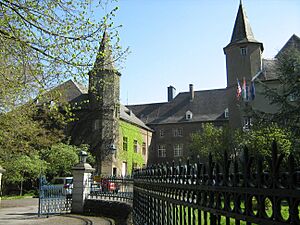
The Dolibois European Center is in Differdange, Luxembourg. It's a special place for students to study abroad. About 125 students go there each semester. They can take classes in subjects like architecture, business, and history. Students live with families in Luxembourg. They are also encouraged to travel around Europe on weekends. The center moved to Differdange Castle in 1997.
Regional Campuses
Miami University has three smaller campuses. Miami University Middletown opened in 1966 in Middletown, Ohio. Miami University Hamilton opened in 1968 in Hamilton, Ohio. The Miami University Voice of America Learning Center opened in 2009 in West Chester, Ohio.
These regional campuses do not have dorms. They offer some bachelor's degrees and associate degrees. They also offer beginning classes for most four-year degrees. The Middletown and Hamilton campuses have their own sports teams.
Academics at Miami
How to Get In
| Admissions statistics | |
|---|---|
|
2021 entering
classChange vs. 2016 |
|
| Admit rate | 88.6
(
|
| Yield rate | 17.0
(
|
| Test scores middle 50% | |
| SAT Total | 1180-1350 |
| ACT Composite | 24-30 |
Miami University looks at many things when deciding who to accept. They check your grades, how challenging your classes were, and your test scores (SAT or ACT). They also read your essays and recommendations. U.S. News & World Report says Miami University-Oxford is "more selective."
For the class that started in fall 2021, Miami received almost 30,000 applications. They accepted about 88.6% of them. Out of those accepted, 17% chose to enroll. This is called the yield rate. About 89.2% of first-year students stay at Miami for their second year. And 83% of students graduate within six years.
The middle 50% of students who started in 2021 had SAT scores between 1180 and 1350. Their ACT scores were between 24 and 30.
Miami University helps students who are National Merit Scholars. These are students who score very high on the PSAT/NMSQT test.
| 2021 | 2020 | 2019 | 2018 | 2017 | 2016 | |
|---|---|---|---|---|---|---|
| Applicants | 29,990 | 26,844 | 27,247 | 30,126 | 30,255 | 29,771 |
| Admits | 26,571 | 24,684 | 23,248 | 22,459 | 20,635 | 19,463 |
| Admit rate | 88.6 | 92.0 | 85.3 | 74.6 | 68.2 | 65.4 |
| Enrolled | 4,519 | 3,824 | 4,309 | 3,936 | 3,822 | 3,799 |
| Yield rate | 17.0 | 15.5 | 18.5 | 17.5 | 18.5 | 19.5 |
| ACT composite* (out of 36) |
24–30 | 24–30 | 26–31 | 26–31 | 26–31 | 26–31 |
| SAT composite* (out of 1600) |
1180–1350 | 1160–1350 | 1210–1390 | 1200–1380 | 1190–1380 | — |
| * middle 50% range |
University Rankings
| ARWU World | N/A |
|---|---|
| USNWR National University | 133 |
| Washington Monthly National University | 255 |
| Forbes | 185 |
| USNWR Undergraduate Rankings | |||
|---|---|---|---|
| Program | Ranking | ||
| Business | 50 | ||
| Computer Science | 117 | ||
| Engineering | 14 | ||
| USNWR National Graduate Rankings | |||
|---|---|---|---|
| Program | Ranking | ||
| Business | 100 | ||
| Chemistry | 128 | ||
| Clinical Psychology | 120 | ||
| Earth Sciences | 89 | ||
| Education | 117 | ||
| English | 89 | ||
| Fine Arts | 158 | ||
| Psychology | 140 | ||
| Social Work | 163 | ||
| Speech-Language Pathology | 55 | ||
| USNWR Global Graduate Rankings | |||
|---|---|---|---|
| Program | Ranking | ||
| Psychiatry/Psychology | 396 | ||
In 2021, U.S. News & World Report ranked Miami University's undergraduate program 103rd among all national universities. It was 46th among public national universities. U.S. News also ranked Miami 3rd for "Best Undergraduate Teaching." It placed Miami as the 3rd best research university in Ohio.
Kiplinger's Personal Finance magazine listed Miami as one of the "100 Best Values in Public Colleges" in 2015. Forbes ranked Miami as one of "America's Best College Buys."
In 2014, BusinessWeek ranked the Farmer School of Business undergraduate program 23rd among all U.S. business schools. Entrepreneur magazine put Miami's Institute for Entrepreneurship in its top ten undergraduate programs. The Wall Street Journal ranked Miami 22nd among state schools for sending students to top graduate programs.
In 1985, a book called Miami one of America's original eight "Public Ivies." This means it offers a high-quality education like the Ivy League schools.
Miami is also praised for its beautiful campus. Newsweek ranked Miami 19th in its 2012 list of Most Beautiful Schools.
Programs of Study
Miami is a large university that focuses on teaching undergraduate students. It offers over 100 main subjects (majors).
Miami University has seven main academic areas:
- College of Arts and Science
- College of Creative Arts
- College of Education, Health, and Society
- College of Engineering and Computing
- Farmer School of Business
- Graduate School
- College of Liberal Arts and Applied Science (Miami Regionals)
The College of Arts and Science is the oldest and largest college at Miami. Almost half of all undergraduate students are in this college. It offers 70 majors in many subjects. These include biological sciences, history, philosophy, literature, mathematics, and physical sciences.
Miami's College of Creative Arts has 14 majors. These are in areas like Architecture, Art, Music, and Theatre. Students often need to show a portfolio or audition to get into these programs.
The College of Education, Health & Society offers 20 undergraduate majors. These include subjects like Educational Leadership, Family Science & Social Work, and Teacher Education.
The College of Engineering and Computing offers 10 majors. These include Chemical Engineering, Computer Science, and Mechanical Engineering. The college moved into a new engineering building in 2007.
Miami's Farmer School of Business is a well-known business school. It offers 9 majors. It also has graduate degrees like the MBA. The Farmer School of Business building is very modern. It opened in 2009.
Miami offers master's degrees in over 50 subjects. It also has doctoral degrees in 12 subjects. The largest doctoral programs are in psychology.
The Miami University Honors College started in 2021. It replaced the old honors program. About 400 students are accepted each year. They are expected to do research that can be published. Students in the Honors College live together and work closely with professors.
University Leadership
A group called the Board of Trustees helps run the university. They make decisions about programs and money.
The Office of the President manages Miami University's money and business. It supports teaching and research. The President works with the Board of Trustees to set the university's goals. Dr. Gregory P. Crawford is the current president. He started in 2016.
Other leaders include the Provost, who oversees academic colleges. There are also leaders for student life, finances, and technology.
Student Life at Miami
Student Body
| Race and ethnicity | Total | ||
|---|---|---|---|
| White | 75% |
|
|
| Foreign national | 9% |
|
|
| Hispanic | 5% |
|
|
| Other | 4% |
|
|
| Black | 4% |
|
|
| Asian | 3% |
|
|
| Economic diversity | |||
| Low-income | 13% |
|
|
| Affluent | 87% |
|
|
As of 2020, Miami University has about 22,971 students. Most of them, 18,669, are on the Oxford campus. About 16,522 are undergraduate students. The rest are graduate students.
In fall 2021, 44% of new students were from Ohio. Students came from all 50 U.S. states and 122 other countries. Miami University has 1,614 international students from 67 countries. Most international students come from China, Vietnam, India, Nepal, and South Korea.
Miami University has a very even mix of male and female students. About 49% are male and 51% are female. This makes it one of the most balanced universities in the U.S.
Student Groups and Clubs
In the 2017–18 school year, Miami had over 600 student organizations. These groups include sports clubs, professional groups, political groups, and religious groups. There are also clubs for fashion, theater, and LGBTQ+ students.
The Associated Student Government (ASG) represents student interests. It works with teachers, leaders, and the Ohio government. It is the official student government of Miami University.
The Miami University Marching Band is the largest student group. It usually has 250 to 275 students. They perform at all home football games and other events.
Mock Trial Team
Miami University has a very successful Mock Trial team. They have won two National Championship Tournament titles. Their most recent win was in 2018. They have finished in the top ten 17 times.
Student Media
Miami has many student media groups. The Miami Student is the student newspaper. It claims to be the oldest university newspaper in the U.S. The Miami Student Magazine publishes longer stories. Inklings is a literature and art magazine. RedHawk Radio (WMSR) is the student radio station. Miami University Television (MUTV) is available on cable in Oxford. UP Magazine is a student-run fashion magazine.
Miami University Men's Glee Club
The Miami University Men's Glee Club is one of the oldest student groups. It started in 1907. It is one of the largest groups of its kind in the country. About 80 singers are chosen by audition. They perform on campus and around the world.
The Glee Club has performed with major orchestras. They have also worked with famous composers and singers. In 2014, they performed at the Normandy American Cemetery and Memorial. They also won a European Choir Competition award.
The Glee Club also has a men's a cappella singing group called The Cheezies.
Living on Campus
Miami University requires first and second-year students to live on campus. Elliott and Stoddard Halls, built in the 1820s and 1830s, are still used as dormitories. They are listed as historic places.
The campus has 46 residence halls. The newest one opened in 2018. The dorms are grouped into eight areas called quads. Students living in dorms have representatives who join the Residence Hall Association.
Greek Life
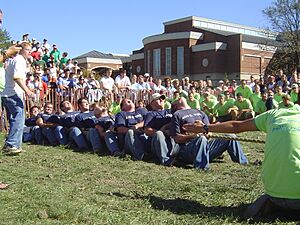
Miami has a long history with Greek life. The first fraternity chapter, Alpha Delta Phi, started in 1832. Miami is called the "Mother of Fraternities" because many fraternities began there. These include the Miami Triad: Beta Theta Pi (1839), Phi Delta Theta (1848), and Sigma Chi (1855). Other groups like Phi Kappa Tau (1906) and Delta Zeta (1902) also started at Miami.
In fall 2017, there were over 2,500 sorority members and 1,500 fraternity members. Miami has about 50 different fraternities and sororities. In fall 2017, the Greek community did almost 12,000 hours of community service. They also raised over $96,000 for good causes.
Miami Mergers
When two students meet at Miami, start a relationship, and then get married, they are called "Miami Mergers." After they graduate, they can register with the university's Alumni Association. In 2022, over 14,400 Miami Merger couples received a Valentine's Day card from the university. This has been a tradition for over 40 years.
Miami University Athletics
Miami's NCAA Division I sports teams are called the RedHawks. There are 18 varsity sports for men and women. Most teams compete in the Mid-American Conference (MAC). The ice hockey team plays in the National Collegiate Hockey Conference.
Before 1928, Miami's teams had different names. In 1996, the Miami Tribe of Oklahoma asked the university to change the nickname "Redskins." So, in 1997, the university changed it to "RedHawks."
Football Team
Miami is known as the "Cradle of Coaches" because so many great football coaches have come from its program. These include Hall of Fame coaches like Paul Brown, Woody Hayes, and Bo Schembechler.
Ben Roethlisberger, a quarterback who played at Miami, won two Super Bowls with the Pittsburgh Steelers. Two former players, John Harbaugh and Sean McVay, have coached their teams to Super Bowl wins. McVay became the youngest head coach to win the Super Bowl at age 36.
Miami's football team plays in Yager Stadium. It has seats for 24,286 fans. The RedHawks play against the Cincinnati Bearcats each year for the Victory Bell. They also play the Ohio Bobcats in the Battle of the Bricks. As of 2021, the RedHawks have won 22 conference titles. In December 2023, they became the MAC Champion.
Basketball Team
The Miami men's basketball team has played in the NCAA basketball championship tournament 17 times. They reached the "Sweet Sixteen" four times. Famous former players include Ron Harper and Wally Szczerbiak.
The team plays in Millett Hall.
Men's Ice Hockey Team
Miami's men's ice hockey team started in 1978. In 2009, the RedHawks made it to the NCAA national title game. They lost in overtime to Boston University.
The team plays at the Goggin Ice Center. The center has two rinks. The main rink, Steve Cady Arena, can hold 3,200 fans.
Synchronized Skating Team
Miami's synchronized skating team started in 1977. It became a varsity sport by 1996. The senior team won U.S. national championships in 1999, 2006, and 2009. Miami won a silver medal at the 2007 World Championships. This was the first medal ever for Team USA in synchronized skating. The college-level team has won 18 national titles.
Famous Alumni
Many people who went to Miami University have done great things. They have made important contributions in government, law, science, business, arts, and sports.
Benjamin Harrison, who became the 23rd President of the United States, graduated from Miami in 1852. Four Governors of Ohio also graduated from Miami. These include Mike DeWine, who is the 70th Governor. Chung Un-chan, who was the 36th Prime Minister of South Korea, earned his master's degree from Miami in 1972. Other politicians include U.S. Senator Maria Cantwell and former U.S. House Speaker Paul Ryan.
Rita Dove, a Pulitzer Prize winner and the first African-American United States Poet Laureate, graduated from Miami. Journalist P.J. O'Rourke also graduated from Miami.
In business, famous alumni include Brian Niccol, CEO of Chipotle. Marne Levine is the Chief Business Officer at Facebook. C. Michael Armstrong was a former chairman/CEO of AT&T. Richard T. Farmer founded Cintas.
In sports, Chris Rose is a TV host for MLB Network and NFL Network. John Harbaugh (coach of the Baltimore Ravens) and Sean McVay (coach of the Los Angeles Rams) both played football for Miami. Paul Brown, who helped start the Cleveland Browns and Cincinnati Bengals, graduated in 1930.
Many Miami alumni play in professional sports. These include Dan Boyle (NHL), Alec Martinez (NHL), Ben Roethlisberger (NFL quarterback), and Wally Szczerbiak (NBA All-Star).
- Notable Miami University alumni include:
-
23rd President of the United States Benjamin Harrison (B.A., 1852)
-
American football coach and executive Paul Brown (B.Ed., 1930)
-
American theoretical physicist Benjamin W. Lee (B.S., 1956)
-
70th Governor of Ohio and former U.S. Senator Mike DeWine (B.S., 1969)
-
American journalist and political satirist P. J. O'Rourke (B.A., 1969)
-
Pulitzer-prize winning American poet and essayist Rita Dove (B.A., 1973)
-
U.S. Senator from Washington Maria Cantwell (B.A., 1980)
-
54th Speaker of the U.S. House of Representatives Paul Ryan (B.A., 1992)
-
Super Bowl XL and XLIII champion quarterback Ben Roethlisberger (2000–2004; B.S., 2012)
See also
 In Spanish: Universidad Miami para niños
In Spanish: Universidad Miami para niños
- Miami University Press
- Cradle of Coaches
- Green Beer Day
- Harker's Run
- Miami Tribe of Oklahoma
- Mother of Fraternities
 | DeHart Hubbard |
 | Wilma Rudolph |
 | Jesse Owens |
 | Jackie Joyner-Kersee |
 | Major Taylor |


